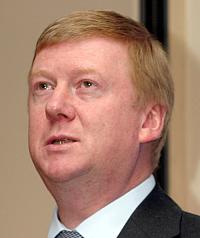
CHUBAIS SURVIVES YET AGAIN, BUT THE PROSPECTS FOR HIS REFORMS ARE NOT GREAT
Publication: Eurasia Daily Monitor Volume: 2 Issue: 119
By:

In Russian politics, there is no other individual — except, certainly for Vladimir Putin — that triggers so much emotional reaction as Anatoly Chubais. Many impoverished Russians hold him personally responsible for the dubious privatization program of the mid-1990s, while new entrepreneurs praise him as the lead architect of economic reforms. Among the political class he is widely respected as the “savior” of Boris Yeltsin’s presidential re-election campaign in 1996. Even his enemies – and he can count among them such dissimilar figures as Moscow Mayor Yuri Luzhkov and presidential adviser Andrei Illarionov – acknowledge his managerial talents and driving power. He has figured in the rating of Russia’s top 100 politicians for so many consecutive months (no. 17 in the latest one) that it is hard to believe that he only turned 50 on June 16 (Nezavisimaya gazeta, May 31).
The Russian media barely noticed this milestone, but Chubais had received so much attention in the previous weeks that he really cannot complain (Polit.ru, June 16). Most of that extensive coverage was not exactly friendly, since its focal point was the shocking blackout in Moscow on May 25. Chubais, as head of the energy monopoly United Energy System (UES) since April 1998, immediately accepted responsibility and made a formal apology, but it was a stern word from President Putin that triggered the avalanche of devastating commentary (Ezhednevny zhurnal, May 27). The blame game reached a climax on June 4, when Putin made an extensive critical evaluation of the management in the energy complex during a Security Council meeting. This breaking news was delivered by the First Channel of Russian TV during the halftime of a soccer match and then presented in every thorny detail with a close focus on Chubais’ pale face (Izvestiya, June 6).
That harsh spotlight appeared to seal the fate of the sole survivor among the “young reformers,” so the State Duma requested a full report on the allegedly outrageous salaries among the UES management and the outspoken Deputy Prosecutor General Vladimir Kolesnikov hinted that a new, high-profile case was being prepared to follow the Khodorkovsky trial (newsru.com, June 8, 9). In a matter of a few days, however, the signal from the Kremlin changed to “hands-off,” to the great disappointment of populist celebrity-politicians like Dmitry Rogozin (Ekspert, June 13). Chubais was “forgiven” – and not because he is a man from St. Petersburg or a member of Yeltsin’s extended “family,” but because nobody among Putin’s courtiers fancies his job.
There are colossal problems in the power industry and the blackout – exploited by eager politicians to attack reforms – in fact proved how necessary the changes were (Vedomosti, May 27). Chubais wants to split his own monopoly and privatize all power stations, leaving the distribution grid under state control, and his plan finally received approval from Prime Minister Mikhail Fradkov with the deadline of December 31, 2006 (Kommersant, April 20). The problem with this reform is that Gazprom, which has shrugged off the “liberal” proposals for dividing its vast empire, shows considerable interest in expanding into electricity production. Thus eliminating the electricity monopoly, instead of opening new space for investors, would simply strengthen another monopoly.
There is also a political dimension to the Chubais saga. Back in 1999 he initiated the creation of the Union of Right Forces (SPS), a political party for the “new entrepreneurial” class. The start was quite successful, but in 2003 the party failed to get the 5% of the vote necessary to qualify for the State Duma. That electoral flop plunged the SPS into a protracted crisis and it still struggles to win the confidence of Russia’s 88,000 millionaires, as measured, certainly, in U.S. dollars (Vedomosti, June 9). The central problem for the party is to define its position vis-à-vis the Kremlin, since asking for trouble by declaring “opposition” is definitely not its style. Now every statement critical of the government’s economic course is accompanied by a loyalty pledge to President Putin (Nezavisimaya gazeta, June 17). In late May, the SPS held a congress where Chubais called for a “new offensive,” seeking to snatch a victory out of the blackout disaster, but the response was generally disappointing (Nezavisimaya gazeta, May 30).
The problem appears to lie in the very heart of the party’s philosophy, which maintains that liberal economic reforms could go hand-in-hand with strengthening the state and could even benefit from an “enlightened authoritarianism.” Chubais remains convinced that Putin could be “won” for the case of reforms and modernization, so after one sharply critical comment on Mikhail Khodorkovsky’s arrest in October 2003 he has not mentioned this politically sensitive case at all. Apparently, he has convinced himself that his political survival is crucial for the liberal cause and so has not noticed that, in Putin’s system of power, this cause was long ago reduced to irrelevance. For the true power-holders, it is in fact much better to keep him in the job, so that the blame for the next possibly catastrophic accident could be allocated accordingly, while the doubtful Western investors could be reassured by the presence of this familiar face. A born CEO and a gifted politician, Chubais is kept harmless for the regime of mediocre but thoroughly corrupt bureaucrats, and he is yet to discover the real price of his Faustian bargain.




